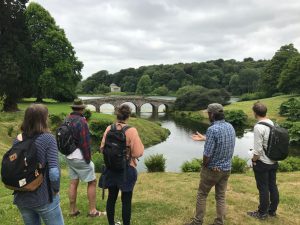By Professor Adrian Howkins, Department of History
In early July 2022, Bristol will play host to the European Society for Environmental History (ESEH) conference. The conference – which usually takes place every two years – will have the overarching theme of ‘Same planet, different worlds: environmental histories imagining anew’.

This is only the second time the ESEH conference has taken place in Britain, and the first time it is happening in England – the first ever ESEH conference took place in St Andrews in Scotland in 2001. The decision to hold the conference in Bristol reflects the strength of environmental history research at the University of Bristol, as well as the city’s strong environmental reputation. More broadly, it reflects the strength of the University of Bristol in the wider field of environmental humanities, which includes environmental history research.
“Environmental humanities are interdisciplinary areas of research, combining the traditional humanities – such as literature, music, history and languages – with areas including science and technology to better understand the relationship between humans and their surrounding environment, both social and natural. Environmental humanities can help us learn about the environmental challenges of the past, address those of the present, and plan for the future.”
The University of Bristol’s Centre for Environmental Humanities (CEH) in the Faculty of Arts is firmly established as one of the leading centres for environmental humanities research in the UK, and there is a wide range of exciting projects taking place. Do follow our CEH blog to keep up with everything that is going on.

In preparation for the ESEH coming to Bristol, Adrian Howkins – one of the co-directors of the CEH – spoke to Marianna Dudley and Andy Flack who are organising the conference.
What is the European Society for Environmental History?
[Marianna] The ESEH is the leading scholarly organisation for people interested in environmental issues from a humanities perspective. It is European, but that doesn’t exclude people in other parts of the world working on this topic. It is very inclusive, and has grown to include a wide range of scholars. It offers networking, mentorship, peer-to-peer support, and a discount on the Environment and History journal. It also has by far the best academic conference going, which moves around Europe and is coming to Bristol this summer!
Why is it important that the conference is coming to Bristol?
[Andy] It recognises Bristol’s status as an environmentally aware and activist city as well as recognising that the University is involved in environmental issues through the Centre for Environmental Humanities, the Cabot Institute, and other research centres and clusters. It is the first time the ESEH has been in the UK since the first meeting in 2001 (St Andrews), and the first time in England. The decision to come to Bristol shows that despite political developments like Brexit, the United Kingdom is still at the heart of the European scholarly community studying environmental change. We love living and working in Bristol – it’s a fun, vibrant, welcoming city and we want to show our colleagues from around the world what a great place Bristol is.
What impact do you hope to have as a result of the conference?
[Marianna] It felt more important than ever to have an in-person conference after such a long hiatus due to the Covid-19 pandemic. We’re looking forward to bringing our scholarly community together and reforging the connections that are so important to our work. In terms of academic legacies, we want to spotlight Bristol as a place to study environmental history and environmental humanities. We hope that other scholars around Britain will seek us out for postgraduate research, postdoctoral fellowships, and academic collaborations, maintaining and building the exciting work that is already taking place.
What opportunities are there for our students to get involved in the Centre and/or the Conference?
[Andy] There will be opportunities for students to get involved in the running of the conference. This will put our students in touch with scholars from all around the world. Please get in touch if you might be interested in joining our conference team. If anyone would like to attend the conference to see what it’s all about, we’ll be offering day rates for University of Bristol staff and students to come to talks and meet with conference attendees. There will be interactive environmental art installations, a talk on wildlife film, science and humanities conversations, and a poet in residence.
If you would like to register for the conference, you can find further details here.

